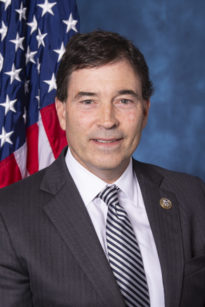#AskCAC Interview with Rep. Balderson (OH-12)
Another week, another interview with a Member of Congress hosting the App Challenge! This week, we interviewed Rep. Troy Balderson of Ohio’s 12th Congressional District. Rep. Balderson serves on the House Committee on Agriculture and House Committee on Transportation and Infrastructure.

Congressional App Challenge (CAC): Why do you think students should take part in the Congressional App Challenge?
Rep. Balderson: Students have everything to gain by participating in the Congressional App Challenge. This one-of-a-kind competition is an experience that students will take lifelong memories and lessons from, while also providing real-life coding experience sought after by potential employers.
CAC: Students are only allowed to take part in the challenge if hosted by their representative. Why did you think it was essential to promote this challenge in your district?
Rep. Balderson: Promoting this challenge provides an opportunity for students to take initiative and apply creativity to develop a usable product. Going through an experience such as competing in the Congressional App Challenge will have benefits into the future as students plan future education and employment.
CAC: What advice do you have for students who may be hesitant to participate in the challenge because they don’t think they are strong enough coders?
Rep. Balderson: I would advise students to have faith in their skills. Students should view this opportunity as a chance to increase their coding capabilities. I understand the fear of not being good enough, but the alternative option is not trying at all – which is much worse in my view.
CAC: What do you think the long-term benefits of having the Congressional App Challenge are?
Rep. Balderson: Students interested in coding or computer science may not have an opportunity that triggers their interest to enhance their skills. The Congressional App Challenge provides an avenue for young people to pursue something that piques their interest in a fun and unique way. The experience of participating in this challenge can spur motivation for a lifelong career or hobby in coding and computer science. It also encourages innovation and creativity – vital components to the personal development of young Americans.
CAC: The App Challenge is a bipartisan initiative with support from both Republicans and Democrats. Why should members, regardless of their political affiliation, host App Challenges in their districts?
Rep. Balderson: While Republicans and Democrats may not always agree on everything, I have no doubt that we concur – providing meaningful opportunities to young people such as the Congressional App Challenge is beneficial. Improving technical skills such as coding, and using those skills to develop a creative App idea is not a red or blue issue. The benefits of the Congressional App challenge have nothing to do with whether the participant lives in a Republican or Democratic congressional district. It is an initiative that benefits all Americans, regardless of political affiliation.
CAC: The switch to online learning this past year revealed the significant digital divide across the country. Whether it be increasing rural broadband infrastructure or ensuring affordable access in urban centers, how do you think Congress should address the digital divide?
Rep. Balderson: Having been born and raised in southeastern Ohio, I have seen firsthand many of the challenges faced by our rural communities. It has become increasingly apparent that Congress is not doing enough to bring connectivity to rural Americans. In the pandemic, the impact of the digital divide exponentially increased as many students could not access online classes and resources.
There are a number of ways Congress can address the digital divide. One program that greatly helped during the pandemic was funding for the Rural Development Broadband ReConnect Program. This program provides loans and grants to provide funds for the costs of constriction, improvement, and acquisition of equipment needed to provide broadband service in eligible rural areas.
It is also vital that Congress protect small, local, consumer-owned cooperatives against overburdensome federal liability when they begin working with the federal government to extend broadband coverage to rural communities. If Congress truly wants to bring broadband to all Americans, we need to ensure our rural-based organizations are willing and able to take up this challenge.
Remember, the App Challenge is live so students can register and submit their apps between now and November 1st!
For more updates on the App Challenge and interviews with members of Congress, follow us on social media:
Twitter: @CongressionalAC
Instagram and Facebook: @CongressionalAppChallenge
